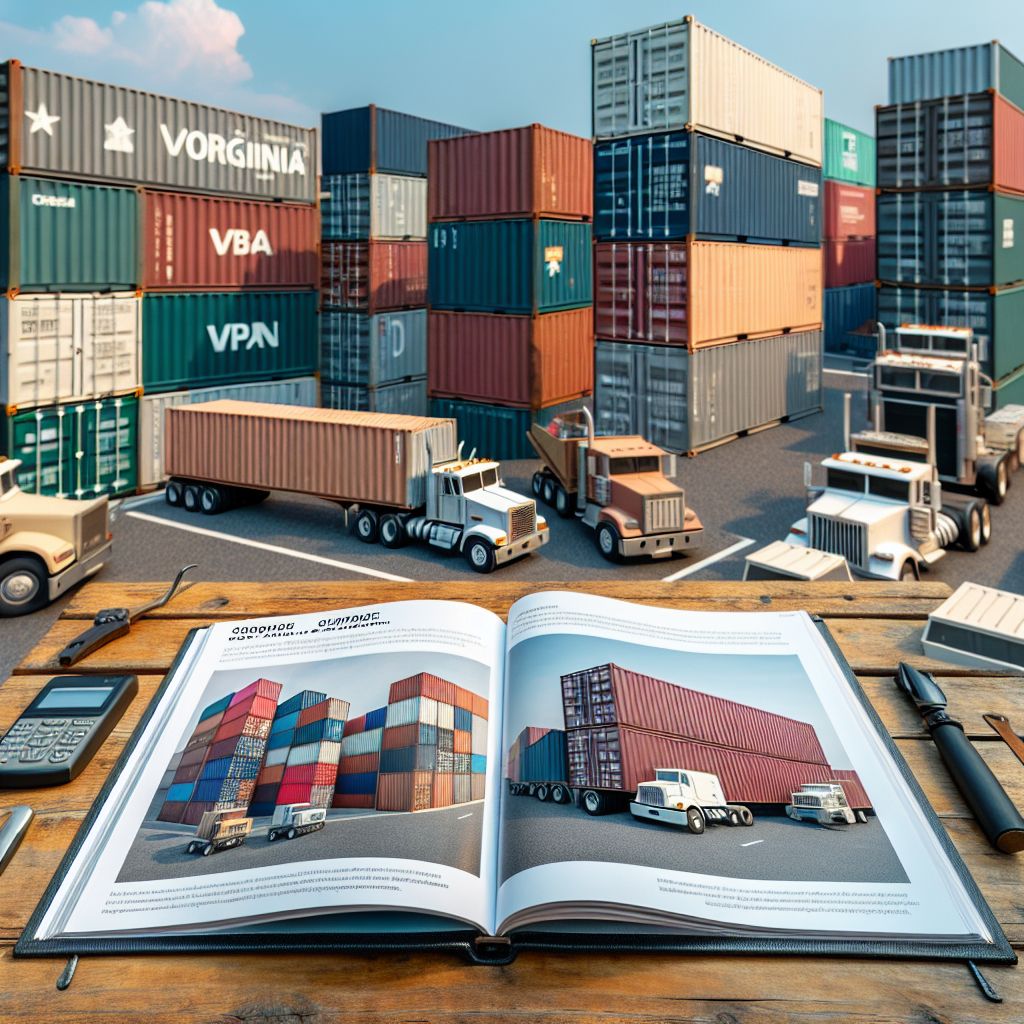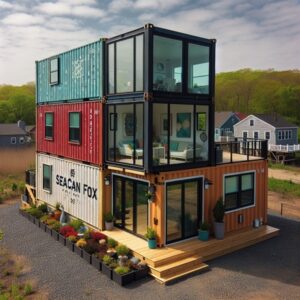
Key Takeaways
- Shipping container prices in Virginia start at $1500 and are cheaper with more choice near to the ports.
- Consider the size and condition of containers, as well as local regulations, before making a purchase.
- Compare local dealers and national sellers to find the best deals and services.
- Be aware of the full costs involved, including delivery and potential modifications.
- Inspect containers thoroughly or consult with a professional before finalizing your purchase.
Virginia Shipping Containers for Sale: New & Used Buyer’s Guide
Looking to buy a shipping container in
Pros and Cons of New vs. Used Containers
First things first, let’s talk about new versus used containers. A new container is like a blank canvas: pristine and ready for whatever you need it for. They’re perfect if you’re after something that looks great and you don’t want to deal with any potential past wear and tear. On the flip side, used containers can be a bargain, often available at a fraction of the cost of new ones. They might have a few dings and rust spots, but they’re just as sturdy if you choose wisely.
My Favorite Container Homes Resource
I compared the top 3 Container Home Guides
to discover the ultimate resource!
See my top recommendation here
New Shipping Containers: When Pristine Condition Matters
If your project demands a container in tip-top shape, a new one is the way to go. These containers have made one trip—often from the manufacturer to your location—and they’re as close to off-the-assembly-line as you can get. They’re ideal for when you need a uniform look, like for a modular building project, or when you’re storing items that require a clean and controlled environment.
Used Shipping Containers: Balancing Cost and Functionality
Used containers come with a history, but that doesn’t mean they’re past their prime. Most importantly, they come with a much lower price tag. They’re graded by their condition, so you’ll know exactly what you’re getting. A Wind and Water Tight (WWT) grade means it’s weatherproof and secure, while a Cargo Worthy (CW) grade is suitable for shipping goods across the oceans. There’s also “As Is,” which is the most economical option but may require repairs.
Factors Influencing Your Purchase Decision
When you’re deciding to buy a shipping container, think about what you’ll use it for. Is it for simple storage, a trendy pop-up shop, or a cozy tiny home? Your intended use will influence the size and condition you’ll need. And remember, while containers are incredibly versatile, you need to make sure you have the space and proper permits to keep one on your property.
- Consider the container’s purpose: storage, transport, or construction.
- Assess the available space and check for any zoning restrictions.
- Think about the container’s condition and whether it meets your project’s requirements.
Size and Condition: Matching Your Needs
Containers typically come in two sizes: 20 feet and 40 feet. The 20-footers are great if you’re tight on space, while the 40-footers offer double the storage. As for condition, decide if you need a new, WWT, CW, or “As Is” container. It all comes down to what you’re storing and how much you’re willing to spend.
Local Regulations and Zoning: Staying Compliant
Before you bring a container onto your property, check with your local Virginia zoning office. Some areas have specific rules about where containers can be placed and how they can be used. You don’t want to buy a container only to find out you can’t use it the way you intended.
Let’s break it down:
- Contact local authorities to understand zoning laws and restrictions.
- Ensure the container’s intended use is compliant with local regulations.
- Consider potential need for permits or modifications to meet code.
Where to Buy: Sourcing Containers in Virginia
Virginia has plenty of options when it comes to buying shipping containers. You can go with local dealers who know the area and can offer personalized service, or you might find a better deal with national sellers who have a larger inventory. Sometimes, local dealers can also help with delivery and setup, which can be a huge plus.
Local Dealers vs. National Sellers: Weighing Convenience and Cost
Local dealers may provide a more hands-on approach and can be more flexible with pricing and services. National sellers, on the other hand, might offer a broader selection and potentially lower prices due to their scale. Consider what’s more important to you: personalized service or variety and cost.
Cost Breakdown: Understanding the Full Investment
When purchasing a shipping container, the sticker price is just one part of the overall cost. There are other expenses to keep in mind, such as delivery fees, which can vary depending on the distance from the supplier to your location. If you’re planning on making modifications, you’ll need to budget for those as well. And don’t forget about the potential costs for site preparation, such as laying a foundation or obtaining permits.
Here’s a quick rundown of potential costs:
- Container purchase price: $1,500-$5,000 for used, $3,000-$6,000 for new.
- Delivery fees: can range from a few hundred to over a thousand dollars.
- Modification costs: depending on complexity, can start at a few hundred and go up to several thousand dollars.
- Site preparation: varies greatly depending on the condition of the site and local regulations.
Keep in mind, these are just estimates and prices can fluctuate based on the market and your specific requirements. For more detailed pricing, consider visiting Container Sales and Leasing for reliable options.
Container Pricing: What Affects the Cost?
The cost of a shipping container is influenced by several factors. The age and condition of the container are the most obvious ones – newer and in better condition means a higher price. The size of the container also plays a role; a standard 20-foot container is going to be less expensive than a 40-foot container. Lastly, market demand can cause prices to vary, so it’s wise to get quotes from multiple suppliers before making a decision.
Delivery and Setup: Calculating Additional Expenses
Delivery and setup are two aspects that can’t be overlooked. You’ll need to ensure there’s proper access for the delivery truck and that the site is prepared for the container. If you need a crane or other special equipment to place the container, this will add to the cost. It’s best to discuss these details with your supplier beforehand to avoid any surprises.
Consider these factors for delivery and setup:
- Accessibility of your site for delivery trucks.
- Need for special equipment like cranes for container placement.
- Site preparation, including leveling the ground and laying a foundation if necessary.

Choosing the Right Container for Storage or Construction
Think about what you need from your container. For storage, you may not need a brand-new container, but you’ll want one that’s secure and weatherproof. If you’re planning to use the container for construction, like a pop-up shop or a tiny home, you might opt for a new container or one that’s in very good condition to minimize the work needed to get it ready for use.
Storage Solutions: Securing Your Belongings
Shipping containers are excellent for secure storage because they’re made to be sturdy and weather-resistant. They can protect your belongings from the elements and theft. When choosing a container for storage, make sure to inspect it for any signs of damage that could compromise its security, like holes or weak door seals.
Here’s what to check:
- The condition of the doors and locking mechanisms.
- Integrity of the container walls and roof.
- Presence of any holes or significant rust.
Modifications for Construction: Customizing Your Space
Shipping containers offer a blank slate for modifications. You can add windows, doors,
Compare Virginia Shipping Containers Providers
| Container Type | Size/Condition | Details |
|---|---|---|
| New Containers | 20ft, 40ft | – Seaworthy and cargo-worthy – Consistent appearance – Higher prices |
| Used Cargo Worthy (CWO) | 20ft, 40ft, more sizes | – Inspected and repaired for cargo shipping – Better condition than WWT – Good for sensitive goods storage |
| Used Wind & Water Tight (WWT) | 20ft, 40ft, more sizes | – Weatherproof with minor dings/dents – Good for general storage – Lower prices |
| Refrigerated (Reefers) | Various sizes | – Temperature-controlled units – For cold storage needs |
| Specialty Containers | Open top, flat rack, side doors, etc. | – Designed for oversized/unique cargo – Customizable loading options |
References:
https://hrcontainers.com
https://www.baycontainerservices.com/intermodal-equipment/containers
https://www.transoceancontainers.net/storage-container-service-areas/shipping-containers-virginia/
https://pelicancontainers.com/united-states-shipping-container-depots/norfolk-va
Key Features and Locations of Top Container Suppliers
It’s important to look at what each supplier specializes in. HR Containers, for example, is known for its reliable delivery service and customization options, making it a solid choice for those looking to personalize their container. Bay Container Services offers a wide range of containers, including specialty options, and provides comprehensive modification and repair services.
HR Containers: Your Local Virginia Container Expert
HR Containers stands out for its commitment to serving the Virginia community. With a focus on both new and used containers, they offer flexibility depending on your budget and needs. They also provide customization services, which can be a significant advantage if you’re looking to modify your container.
Bay Container Services: Comprehensive Container Solutions
Bay Container Services is another excellent option, providing a variety of containers and a full suite of services, including modifications and repairs. This can save you time and hassle by being a one-stop shop for all your container needs.
Comprehensive Supplier Comparison
When comparing suppliers, don’t just look at the price. Consider the value they offer through their services, the quality of their containers, and their proximity to your location. Take the time to call them, discuss your needs, and ask for quotes. Remember, the right supplier will not only sell you a container but also provide support and advice throughout your purchase process.
In the next section, we’ll go into more detail on what to look out for when inspecting containers and how to navigate the logistics of delivery and setup.
As you edge closer to making a decision on purchasing a shipping container in Virginia, there’s a checklist you should follow to ensure you’re making the right choice. From inspecting the container to understanding the logistics of delivery, let’s go through the essentials.
Checklist Before You Buy
Buying a shipping container isn’t something you do every day, so it’s crucial to go through a checklist to make sure you cover all bases. This list will help you avoid common pitfalls and ensure you’re satisfied with your purchase.
Inspect Before You Invest: Container Inspection Tips
When you’re looking at containers, it’s essential to inspect them thoroughly. If you’re buying used, check for rust, dents, and whether the doors close securely. If there’s any damage, it could affect the container’s structural integrity. For new containers, you’ll want to ensure they are indeed in pristine condition as promised.
Delivery Logistics: Making Sure Your Container Arrives Safely
Once you’ve found your perfect container, you need to get it to your location. This means considering the delivery logistics. You’ll want to confirm that the seller offers delivery, and if not, you’ll need to arrange transport yourself. Ensure the delivery path is clear of obstacles and that your site is prepared for the container’s arrival.

Frequently Asked Questions (FAQ) for Shipping Containers Sales in Virginia
What Are the Typical Prices for Shipping Containers in Virginia?
In Virginia, used shipping containers typically range from $1,500 to $4,000, while new containers can cost between $3,000 and $6,000. Remember, these prices can fluctuate based on the container’s size, condition, and the current market demand. For a more detailed guide, check out our shipping containers buying guide.
How to Check If Containers Are Permitted in My Area?
To find out if containers are permitted in your area, check with your local zoning office. They can inform you of any restrictions or permits required. It’s important to do this before making a purchase to avoid any legal issues.
What Are the Most Popular Container Sizes Available?
The most commonly purchased shipping container sizes are 20-foot and 40-foot containers. The 20-foot container is suitable for most storage needs, while the 40-foot container offers double the space, making it ideal for larger projects or conversions.
Are Customization Options Available for Containers?
Yes, many suppliers offer customization options for containers. You can add windows, doors, insulation, and more. It’s best to discuss your needs with the supplier to understand what modifications they can provide.
- Windows and doors for natural light and access.
- Insulation for temperature control.
- Electrical and plumbing for livable spaces.
What Should I Expect Regarding Delivery and Setup?
Delivery and setup costs vary depending on the distance from the supplier to your location and the complexity of the delivery. Some suppliers include basic delivery in the purchase price, while others may charge additional fees. Be sure to clarify these details before completing your purchase. For more information on container delivery and setup, you can refer to HR Containers FAQs.






Leave a Reply